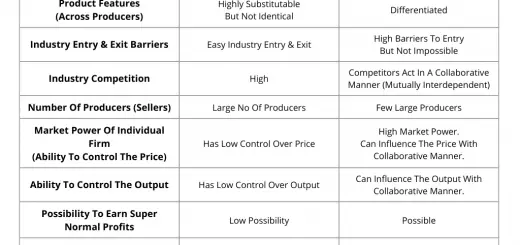Perfect Competition: 8 Main Characteristics / Causes
Perfect competition arises when there are very low entry barriers to entry to the market, with high competition, and products are identical. A firm in a perfectly competitive market is a price taker. It means that the firm has to accept the competitor’s general pricing in the market.
Following are the Characteristics / Causes / Features of the Perfect Competition Market,
Characteristics (Causes / Features) of Perfect Competition Market
1. Homogenous (Non Differentiated) Products Produced By Firms
In a perfect competition market, all producers produce similar products. These products are identical or non-differentiated. This is known as ‘homogenous’ in economic terms.
More simply, customers can buy the product from one producer or another, which serves the same purpose that it is. There is no uniqueness inherited from the products produced by one producer which brings more value.
2. Entry and Exit Barriers are Low
Perfectly competitive industries allow firms to easily enter and exit the industry. New firms can easily enter the market. There are no major difficulties to enter the industry in terms of cost, regulation, patents, etc.
3. Customers Have Perfect Information About Products
Consumers are well aware of the market changes and have perfect knowledge. This simply means that customers know what producers sell the lowest price of the substitutable products.
Customers can switch from one supplier to another easily when they have the perfect information.
4. High Competition
There are many buyers and sellers available in a perfectly competitive market. This makes the perfect competition market structure as high competitive. There are many choices available for the consumers, and also producers have to compete more with the reveries.
Each producer can not raise prices as they wish. If they do so, they will be out of the market because customers will switch to cheaper substitutable products easily.
5. No Market Power for Individual Firm
The perfect competition market has non-differentiated products. Hence a single producer cannot increase the price of their goods or services on their own.
In simple terms, the producers have to sell at the ‘equilibrium’ price, which the firm sells at the maximum price of supply and demand alignment.
6. A Large Number of Producers
There is a large number of producers in the perfect competition market. If not, they will go out of business, as many other firms sell the same good at a lower price. As a result, customers have little cost of switching to a substitute good.
7. No Super Economic Profits
All producers in a perfectly competitive market earn normal profits and no firms can earn super-normal profits. Firms are known as price takers. So any firm can not earn a super economic profit.
8. Individual Firm Does Not Have Substantial Market Share
Due to the low entry barriers and substitutable products, any firm can not enjoy a substantial market share. The market share will be distributed among many products in the industry.
If a firm was to reduce prices, it would start making a loss, because there is very little room for the marginal profit. If any firm increases prices, some competitors will attract customers and put the firm out of business.
Read More:
Market Structures
Perfect Competition
- Overview, Definition, & Features of Perfect Competition
- Main Characteristics / Causes of Perfect Competition
- Real Examples of Perfect Competition (in USA, Canada, Australia, World)
- Advantages and Disadvantages of Perfect Competition
Monopolistic Competition
- Overview, Definition, & Features of Monopolistic Competition
- Main Characteristics / Causes of Monopolistic Competition
- Real Examples of Monopolistic Competition (in USA, Canada, World)
- Advantages and Disadvantages of Monopolistic Competition
Oligopoly Market
- Real Examples of Oligopoly Market (in the USA, Canada, World)
- Seven Important Characteristics of Oligopoly Market
- Advantages and Disadvantages of Oligopoly Market
Monopoly Market
- Definition, Examples, and Characteristics of Monopoly Market
- Real Examples of Monopoly Market (in the USA, Canada, Australia, World)
- Important Characteristics / Causes of Monopoly Market
- Advantages and Disadvantages of Monopoly Market


